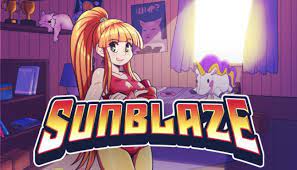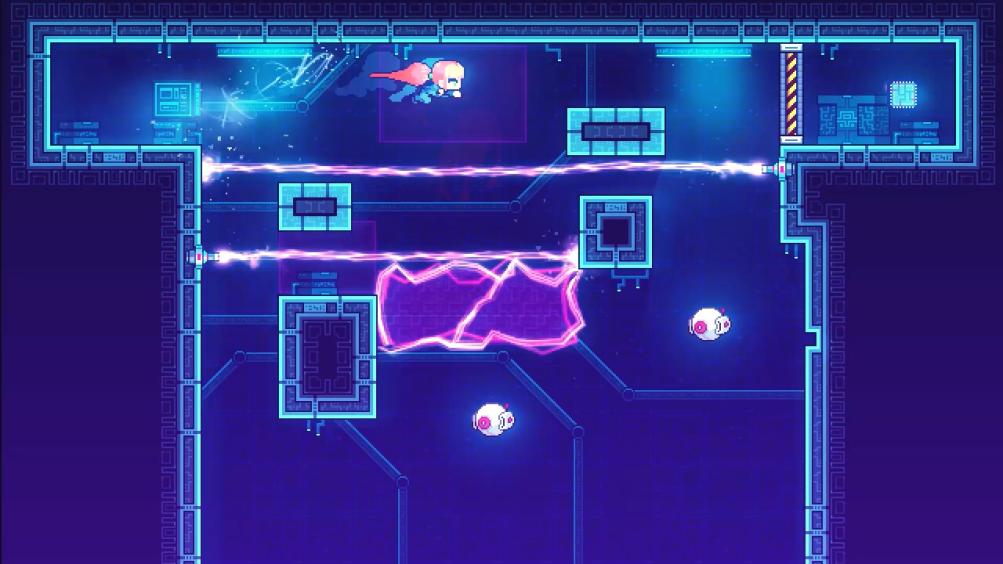Search
[{{{type}}}] {{{reason}}}
{{/data.error.root_cause}}{{{_source.title}}} {{#_source.showPrice}} {{{_source.displayPrice}}} {{/_source.showPrice}}
{{#_source.showLink}} {{/_source.showLink}} {{#_source.showDate}}{{{_source.displayDate}}}
{{/_source.showDate}}{{{_source.description}}}
{{#_source.additionalInfo}}{{#_source.additionalFields}} {{#title}} {{{label}}}: {{{title}}} {{/title}} {{/_source.additionalFields}}
{{/_source.additionalInfo}}Sunblaze (PC)

Sunblaze
Developed By: Games From Earth
Published By: Bonus Stage Publishing
Released: June 3, 2021
Available On: Windows, Switch
Genre: Precision Platforming
ESRB Rating: T for Teen (Blood; Violence)
Number of Players: Single-player
Price: $14.99
(Humble Store Link)
Thanks to Bonus Stage Publishing for sending us a review copy!
The Veldt. The Danger Room. The Holodeck. Ender’s Game. P7J-989. One thing SciFi stories have taught us is that all forms of virtual reality will go haywire somehow, and the safeties will be disabled. This is the basic setup for precision platformer Sunblaze as you guide heroine-in-training Josie through an ever-escalating series of training exercises to escape the matrix and rescue her dad.
Sunblaze doesn’t complicate the controls too much. Your basic controls are simply to run, double-jump, or dash your way through literally hundreds of levels. Ledge grabs and overhanging rails are also included. Everything is smooth and it just flows like a hot knife through butter. Drones are quickly introduced, and they must be jumped on or dashed through to destroy them, which also resets our double jump and dash. Unstable blocks will fall after you land on them, pushing you towards the next safe spot to land. Reaching the floating microchip advances to the next level, but the sequences to reach it will become increasingly involved. Fail the superhero training, and you’ll find yourself scratching off another one of several thousand deaths over the six-odd hours it takes you to finish the game.
Each of the game’s six chapters is themed around a new environment, and comes with its own set of new hazards and mechanics. The second chapter’s most significant contribution is the "Thwomp," a platforming staple which comes barreling towards you when you cross its line of sight. The third chapter’s laboratory introduces lasers and asks you to use unstable falling blocks to block them. The fourth chapter is set in an old mine, where volatile TNT crates and radioactive barrels explode shortly after being disturbed. The fifth chapter sees you flying through aquatic environments as a fireball. The exceedingly long final chapter introduces dash blocks which respond to being rammed with dashes, and play a similar role as the Thwomps of the second chapter, but with far more flexibility. It’s a slight pity that each of these chapter mechanics is contained within its own chapter and that they don’t get used together, but during their time in the sun they do shine quite brightly.

Strong Points: Excellent gateway into precision platforming
Weak Points: Levels can be difficult to parse at a glance; dad jokes
Moral Warnings: Cartoon violence; blood sprays on death; minor swear words; skin-tight superhero costume
Each chapter begins with a snippet of story before introducing its main mechanic. I never felt overwhelmed by the rate at which the difficulty was increased in each section, even as movement sequences became longer and more intricate. Most levels are also hard to puzzle out fully at a glance, but there’s usually only one or two obvious paths forward to brute force. Whereas a game like Super Meat Boy has only one obvious path, Sunblaze’s moving parts obscure that one path, but this isn’t a big deal. Trying the most obvious path forward without bothering to scan the level was rarely a problem for me. Heavy use of crumbling platforms closed off the area behind me and forced further action, and usually the most obvious way forward was the correct one. Every level fits into a single screen, making them reasonably easy to parse. Only three levels out of some 200 left me scratching my head for more than a few minutes. It’s that light puzzle element that inspired in me a few “flash of genius” moments akin to when the comic hero figures out the villain’s weakness.
Sunblaze also comes with a Zen Mode and accessibility features for players who can never get the timing right. Zen Mode is a shorter collection of much easier levels that can be finished in about 30 minutes. All story cutscenes are included in here, but it just feels like a letdown compared to Normal mode. If you’re able to collect the datacubes in Normal mode, you unlock Hard mode, and the levels here are only for the most masochistic players. The accessibility features amount to in-game cheats such as infinite dashing, infinite jumping, and invulnerability. The elite 1% that makes up speedrunners may not care for these functions for normal play, but it’s certainly fun to mess around with it once you’re done.

Higher is better
(10/10 is perfect)
Game Score - 84%
Gameplay – 16/20
Graphics – 8/10
Sound – 8/10
Stability – 5/5
Controls – 5/5
Morality Score - 88%
Violence – 7/10
Language – 8/10
Sexual Content – 9/10
Occult/Supernatural – 10/10
Cultural/Moral/Ethical – 10/10
There’s clearly a lot of attention to detail in the pixel graphics. Standing by a ledge will see Josie balancing on her toes precariously. There’s a lively bounce to everything that moves, and it jives well with the dad-humour that keeps popping up. The sound is also quite well done, with all the various explosions and smashing and jumps adding their bass to the soundtrack.
The game does register a few minor moral issues. There is some minimal cartoon violence against robots. Josie is the prime victim as she dies in electrocution and bloody buzz-saw accidents, but the blood can be disabled. Minor swear words (H*ll, sucks) pop up a few times, and “bit” is used as a clever substitute for b***h. No skin is shown, but Josie’s hero costume does accentuate her figure as much as the skin-tight uniform of any comic book hero.
Sunblaze has all the marks of being a great gateway title into the precision platforming genre, and the sparse moral issues make it an easy recommendation. If the idea of failing thousands of times within a few short hours has never appealed to you, this is a great way to learn how to embrace failure.






